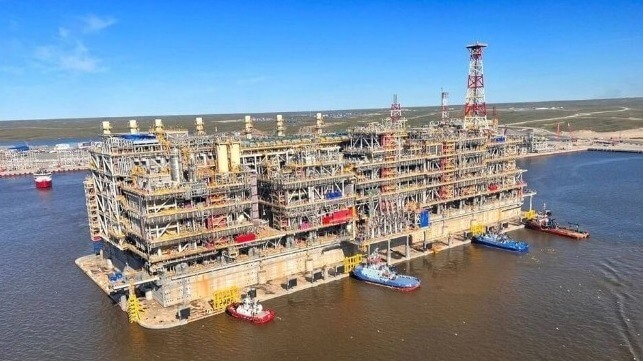Arctic LNG 2's Investors Get Nervous as American Sanctions Begin to Bite

Novatek's Arctic LNG 2 project is one of the most significant liquefied natural gas export developments in the world, and it promises to be a major source of revenue for the Russian state - but U.S. sanctions appear to be having an effect on its progress. The project is dependent on Western components and foreign investment, and both may be at risk.
In September, the U.S. Department of State blacklisted dozens of Russian companies in connection with the invasion of Ukraine, including some that are critical to Novatek's plans. The list includes Arctic Transshipment, a Russian shipping company that will operate two LNG floating storage units (FSUs) to support the Arctic LNG 2 project. Without the FSUs, the project's export cargoes will have a much harder time getting to market. The U.S. has also sanctioned JSC Energies, Nova Energies and Abu Dhabi-based Green Energy Solutions for providing engineering services and technology for the project.
Arctic LNG 2's first liquefaction train started up last week, and Russian Deputy Prime Minister Alexander Novak says that it will ship its first commissioning cargoes in the first quarter of 2024. But that may not help the project's mid-term prospects. Kommersant, a leading Russian news outlet, reports that all of the foreign shareholders in the project - TotalEnergies, CNPC, CNOOC, and a JV investment vehicle backed by Mitsui and JOGMEC - have declared a notice of force majeure on their participation in Arctic LNG 2. This means that they will not be receiving their contracted deliveries of LNG from the terminal. Novatek has also reportedly sent notices to buyers that it is declaring force majeure on deliveries.
The situation could change if political winds shift in Washington: CNPC, CNOOC and Japanese buyers have launched a process to ask for a sanctions exemption for Arctic LNG 2 deliveries. In the meantime, though, there are signs that the investors are restless. Japanese industrial conglomerate Mitsui, one of the foreign project partners in Arctic LNG 2, has reportedly withdrawn its staff from Russia.
The declaration of force majeure threatens the project's financing arrangements, according to Kommersant. Construction loans require contracted volumes as an underlying guaranteed revenue stream, and it is unclear whether Novatek has already locked down all of its $10 billion in needed loans. Inflation has also increased the project cost by nearly 20 percent, and if outside investors are unwilling to help carry the extra expense, Novatek will have to pick up the cost in another manner.
Part of the problem is the withdrawal of foreign suppliers and contractors from Russia. Baker Hughes, Saipem, Boskalis, Technip and Linde have all quit, and Novatek has had to attempt to replace these blue-chip oil and gas engineering firms with less well-known alternatives.
Novatek also faces problems in securing adequate tonnage to carry its exports to market. The firm needs specialized icebreaking LNG carriers to transit the icy waters of the Northern Sea Route, and these vessels exist nowhere else. It has 21 of these high-spec ships on order, but sanctions have delayed their construction. Russian yard Zvezda holds the contract for 15 of them, but has had to delay production by more than a year because of sanctions-induced supply chain problems. The new sanctions on Arctic Transshipment, the FSU operator, exacerbates this problem.
